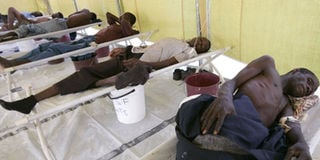Zimbabwe declares national emergency over cholera

Cholera patients rest on their beds inside the male ward of Budiriro Polyclinic in Harare December 1, 2008. Zimbabwe has declared the fast spreading cholera epidemic that has claimed more than 560 lives so far a national emergency. Photo/REUTERS
Zimbabwe has declared the fast spreading cholera epidemic that has claimed more than 560 lives so far a national emergency and appealed for urgent international support to avert mass deaths.
The declaration by the government, which for weeks tried to put a brave face amid the worsening crisis, is the first official admission that the extent of the cholera outbreak was under reported.
More people were also reportedly dying of anthrax after they ate cattle dying from the contagious disease.
The villagers are eating the infected meat out of desperation in the face of mounting starvation in a country once regarded as the breadbasket of southern Africa.
In an appeal to donors, Health and Child Welfare Minister, Dr David Parirenyatwa said Zimbabwe's health infrastructure had collapsed and hospitals were in urgent need of drugs, food and equipment.
"Our central hospitals are literally not functioning," he said. "Our staff is demotivated and we need your support to ensue that they start coming to work and our health system is revived."
The once prosperous country, which now faces its worst economic crisis in history has the world's highest rate of inflation with official estimates putting the figure at 231 million percent.
Experienced doctors and nurses have left for better paying jobs in neighbouring countries and those who have remained are in endless job boycotts.
With one of the world's highest HIV/AIDS prevalence rates the country faces an acute shortage of medicines, laboratory reagents, surgical sundries, renal and laundry equipment, X-ray films and boilers.
"The emergency appeal will help us reduce the morbidity and mortality associated with the current socio-economic environment by December 2009," Dr Parirenyatwa said.
Nine out of Zimbabwe's 10 provinces have recorded cholera cases since an outbreak was first reported in Chitungwiza, a town lying 30 kilometers from the capital Harare.
But Harare has been the hardest hit because of frequent water cuts and garbage that goes for days without being collected.
The United Nations says cholera is killing 80 Zimbabweans a day. Aid agencies have put the number of recorded cholera cases at 12,546.
The European Union, which has given Zimbabwe nine million euros to fight the epidemic, said it was shocked by the extent of the country's humanitarian crisis.
Mr Louis Michel, the EU Commissioner for Development said: "I am shocked at the deteriorating humanitarian crisis in Zimbabwe and call upon the authorities to respond quickly to this cholera outbreak by allowing full assistance from international humanitarians."
He described cholera as a disease of destitution that used to be almost unknown in Zimbabwe.
Neighbouring South Africa, Botswana and Zambia have also begun battling cholera cases spilling over their borders.
Botswana announced that it will donate 3 million pula ($371,000) to its crisis-ridden neighbour Zimbabwe.
Botswana is a leading critic of the Zimbabwe government of President Robert Mugabe and this has strained relations between the two southern African neighbours.
The Botswana ministry of foreign affairs spokesman, Mr Clifford Maribe said they will channel the money they have donated to Zimbabwe through UN agencies like WHO, UNICEF and WFP. He said they are giving money to the agencies and not the government because Botswana has always encouraged donors to assist the people of Zimbabwe.
“We have no quarrel with the people of Zimbabwe. They are in this because their leadership has failed to form a government. The money is intended for the people and not the authorities,” Maribe to dispel notions the donation contradicts Botswana’s call for the international community to isolate Zimbabwe.
The statement from the Botswana ministry of foreign affairs said the donation has been made because of concern for the deteriorating humanitarian situation in Zimbabwe. It added that the food shortages in Zimbabwe and recent cholera outbreak should trouble the conscience of the international community.
The donation comes hot on the heels of reports that Botswana intends to close its diplomatic mission in Zimbabwe because it is annoyed by the intransigence of Mugabe and his refusal to share power with the opposition. Botswana has denied the reports.




